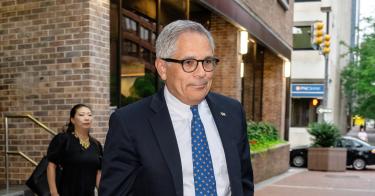Philadelphia District Attorney Larry Krasner lost a major appellate case last week against Michelle Henry, the State’s Democratic Attorney General. Although Henry was the putative winner, the real winners are the 682,000-plus people who ride the transit system each day in and around the City of Brotherly Love.
Krasner, Philly’s Soros-funded rogue prosecutor, sued Henry over a 2023 state law signed by Governor Josh Shapiro, called Act 40, which authorized the state’s attorney general to appoint a special prosecutor to handle all crimes on the Southeastern Pennsylvania Transportation Authority (SEPTA) transit system.
Act 40 was originally passed because Krasner’s pro-criminal policies, such as refusing to prosecute simple assault, theft, disorderly conduct, resisting arrest, and watering down felonies in serious cases, were endangering everyone who rides SEPTA. Robberies and aggravated assaults jumped more than 80% on SEPTA from 2019 through 2021, even though the system carried fewer riders because of the pandemic.
Upset that the state was infringing on his turf, however, Krasner claimed that the statute was unconstitutional for a variety of different reasons.
>>> Meet Larry Krasner, the Rogue Prosecutor Wreaking Havoc in Philadelphia
Last week, in the case Krasner v. Henry, Pennsylvania’s second highest court rejected all of Krasner’s arguments and upheld the law. As the Commonwealth Court of Pennsylvania noted in its 47-page opinion, the General Assembly determined that Krasner “permitted crime to metastasize within SEPTA.”
The court found that the Commonwealth’s purpose in establishing SEPTA was to “promote the safety and welfare of Commonwealth citizens,” and, that the statute enabling the creation of SEPTA made clear that it “shall in no way be deemed to be an instrumentality of any city or county or other municipality.” SEPTA, the court held, is an agency and instrumentality of the state itself.
Two of Krasner’s arguments were particularly enlightening, as they clearly demonstrate his contempt for the police and why he is the criminals’ best friend in Philadelphia.
First, despite irrefutable evidence to the contrary, Krasner claimed that he and his office vigorously prosecute those who commit crimes on SEPTA, and that any decrease in the number of cases his office has filed is due to a sharp decrease in arrests by SEPTA Transit Police Department Officers.
Krasner’s “blame the police” rhetoric is one of his go-to responses, even though his policies of not prosecuting cases or holding violent criminals accountable are the main drivers of the crime spike in Philly.
Second, Krasner argued that Act 40 is unconstitutional because it would impair his ability to raise arguments in the defense of criminal suspects! That’s right, Krasner, a prosecutor, objected to this law because it would limit his ability to defend the very criminals he is meant to prosecute.
Thankfully, the Court of Appeals rejected that absurd agreement, writing that “the DA has no standing to raise arguments for criminal defendants.”
That’s what public defenders, or criminal defense attorneys are for.
>>> The Blue City Murder Problem
But Krasner’s ridiculous posturing should come as no surprise. On the night he was first elected as the District Attorney, he told the assembled crowd that he was a “public defender with power.”
The good news is things could be changing for Krasner—and the good people of Philadelphia—soon. Last Friday, the Attorney General appointed former prosecutor Michael Untermeyer as special prosecutor to investigate and prosecute crimes on SEPTA.
His appointment is significant, as Untermeyer used to work as an Assistant District Attorney in the Philadelphia District Attorney’s Office and ran against Krasner for District Attorney in 2017 but lost. Now he gets to do the work he would have done had he been elected.
Crime stinks in Philly, and everyone knows it. And even if some people in Philly won’t admit it, the reason is Krasner and his soft-on-crime policies.
No doubt, that’s why the Democratic Governor signed Act 40, and the Democratic Attorney General appointed Krasner’s previous opponent as special prosecutor.
Perhaps, now, they can clean up the mess Krasner has created.
This piece originally appeared in The Daily Wire




